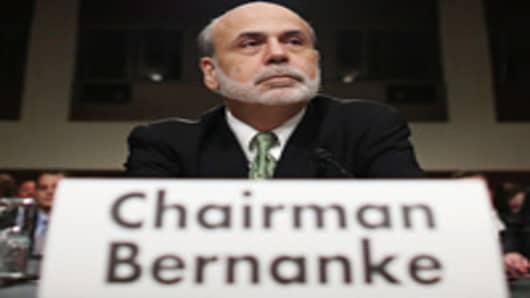Federal Reserve Chairman Ben Bernanke offered little hope Thursday for anyone looking for more central bank intervention, instead relying on an oft-repeated pledge to step in if necessary.
As a result, the stock market, which had been well into its third consecutive strong rally, pared gains as traders weighed where the Fed stands on the economy's late-spring slowdown.
"Boy, that was anti-climactic," Pierpoint economist Stephan Stanley said. "There was absolutely nothing in terms of a policy signal...no different than what he might have said at any point over the last few years."
Bernanke told a congressional panel that the central bank is "prepared to take action" if needed to boost the U.S. economy, but made no specific commitment to more easing.
Instead, the Fed leader said the economy continues to grow at a moderate pace but faces challenges from the jobs market as well as the debt crisisin Europe.
Overall, the remarks offered little change from the statements he has made over recent months that more quantitative easing is possible but not certain and will depend on how growth occurs.
"The situation in Europe poses significant risks to the U.S. financial system and economy and must be monitored closely," Bernanke said. "As always, the Federal Reserve remains prepared to take action as needed to protect the U.S. financial system and economy in the event that financial stresses escalate."
There was some speculation, though, that Bernanke was being coy.
Few in the market had expected him to deliver a firm commitment to another round of easing. But remarks from San Francisco Fed President and Bernanke confidante Janet Yellenon Wednesday indicated the central bank is weighing a move.
Bill Gross, co-CEO of bond giant Pimco, said on Twitter that the "Bernanke/Yellen tag team opens door to more QE" for which he placed a 60 percent chance.
"Bernanke doesn’t appear to want to commit to further quantitative easing in front of the audience," said Andrew Wilkinson, chief economic strategist at Miller Tabak in New York.
"His words are clear and...the economy is not growing fast enough to deliver the Fed’s dual mandate."
The Fed next meets on June 19-20.
As he also has in the past, Bernanke delivered a stern warning for Washington to act more aggressively on debt reduction and fiscal responsibility.
"At best, rapidly rising levels of debt will lead to reduced rates of capital formation, slower economic growth, and increased foreign indebtedness," he said. "At worst, they will provoke a fiscal crisis that could have severe consequences for the economy."
Bernanke's speech comes with the U.S. economyat a crossroads.
Recent data has indicated weakness in employment and production as well as factory orders and housing.
Perhaps more importantly for the Fed chairman, the stock market, until the recent three-day rally, had been in a strong selloff since early May. Bernanke views the market as the delivery mechanism for the "wealth effect" he has trumped relative to Fed policy.
Bernanke spelled out three objectives for Congress: to put the budget on a "sustainable long-run path"; to avoid the "fiscal cliff" that would come with automatic tax increases and spending cuts that would occur if Washington fails to reach deficit-reduction goals by the end of 2012; and to use tax policy to grow the economy.
"Although we cannot expect our economy to grow its way out of federal budget imbalances without significant adjustment in fiscal policies, a more productive economy will ease the tradeoffs faced by fiscal policymakers," he said.
He said Congress has a number of options it can use to promote budget stability.
"I'd be much more comfortable if Congress would take some of this burden from us and address those issues," Bernanke said during a question-and-answer session.



